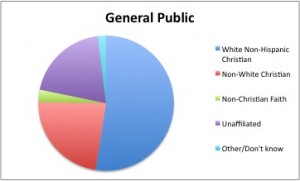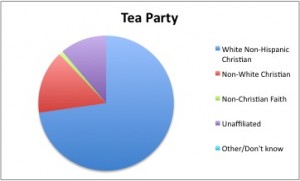 If you haven’t heard it, give Krista Branch’s “I am America” a listen. According to ABC’s Huma Khan, the song is being heralded as the Tea Party’s “anthem,” and like most good sacred songs, it reveals quite a bit about the movement that has embraced it. In this case, what’s notable about “I am America” is its strong religious theme, signaling the importance of religion to the Tea Party movement.
If you haven’t heard it, give Krista Branch’s “I am America” a listen. According to ABC’s Huma Khan, the song is being heralded as the Tea Party’s “anthem,” and like most good sacred songs, it reveals quite a bit about the movement that has embraced it. In this case, what’s notable about “I am America” is its strong religious theme, signaling the importance of religion to the Tea Party movement.
In her piece, Khan points to religious language in Branch’s “anthem” and the overtly religious messages in the music video, where a little girl holds a sign, calling attention to a verse in the Book of Chronicles. According to Khan, “the verse is often understood to mean that God will forgive his people, or U.S. Christians, and heal the United States if people ask for forgiveness.”
Our Research Director, Daniel Cox, provided numbers and analysis for Khan’s piece. He points out that, according to PRRI’s data, more than 7-in-10 (72%) Americans who identify as members of the Tea Party movement are also white Christians. Three-quarters (75%) of Tea Party identifiers also describe themselves as “Christian conservatives” compared to less than half (42%) of the American public.
 Tea Party spokespeople are quick to step on the connection. “It’s not about religion,” Jenny Beth Martin, founder of the Tea Party Patriots, told Khan. “Our movement started and has been more focused on fiscal responsibility and we really haven’t focused on religious issues or social issues. Each member within the movement has their own religious beliefs. Generally those don’t come into play at Tea Party events.”
Tea Party spokespeople are quick to step on the connection. “It’s not about religion,” Jenny Beth Martin, founder of the Tea Party Patriots, told Khan. “Our movement started and has been more focused on fiscal responsibility and we really haven’t focused on religious issues or social issues. Each member within the movement has their own religious beliefs. Generally those don’t come into play at Tea Party events.”
But the numbers are hard to ignore, especially when the Tea Party’s religious profile is compared to that of the general public. There’s a clear dissonance between this data and Martin’s claim that the Tea Party is a non-religious movement based primarily on an overriding concern about fiscal responsibility. After all, only 27% of the Tea Party identify as Libertarian.